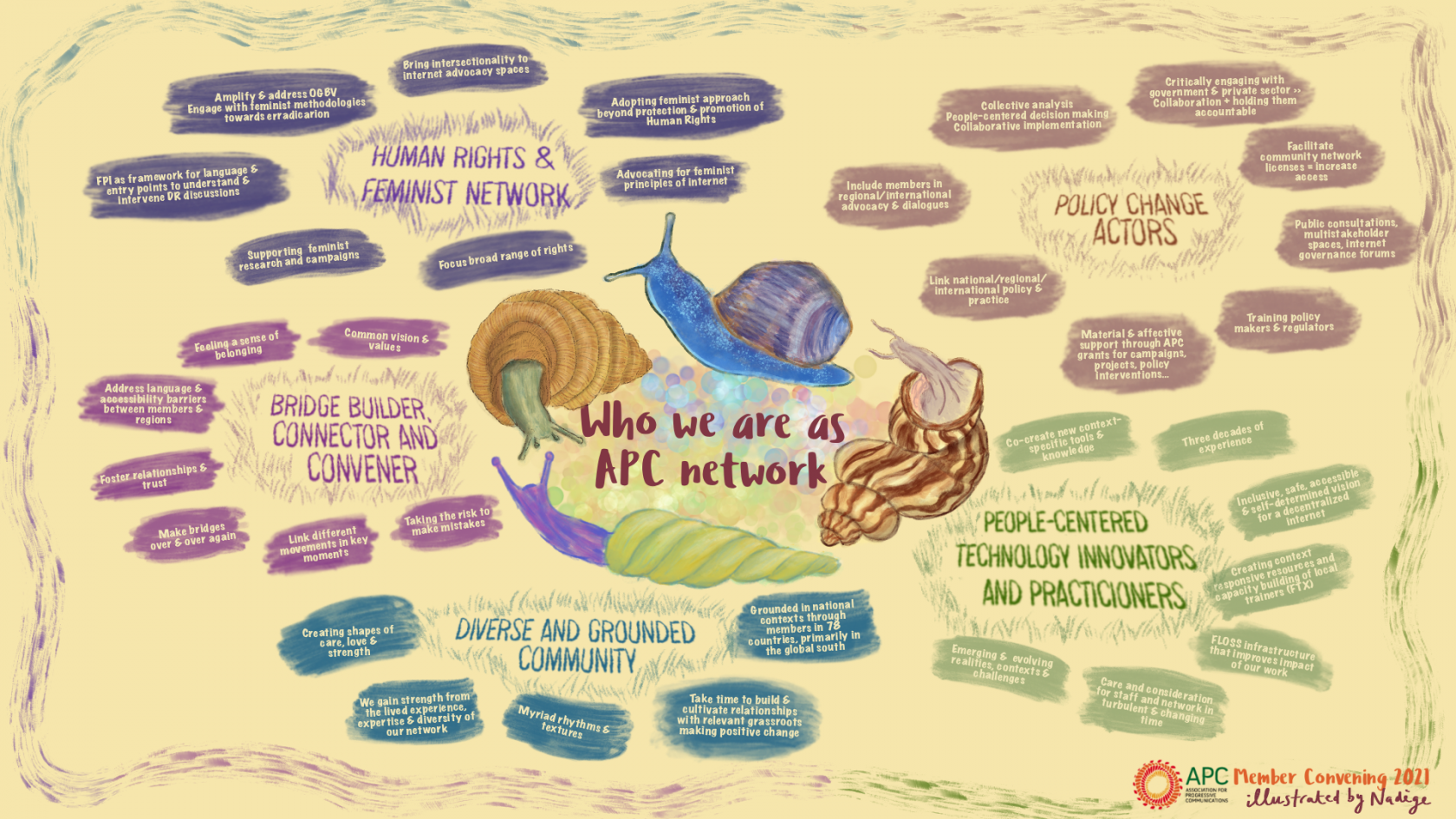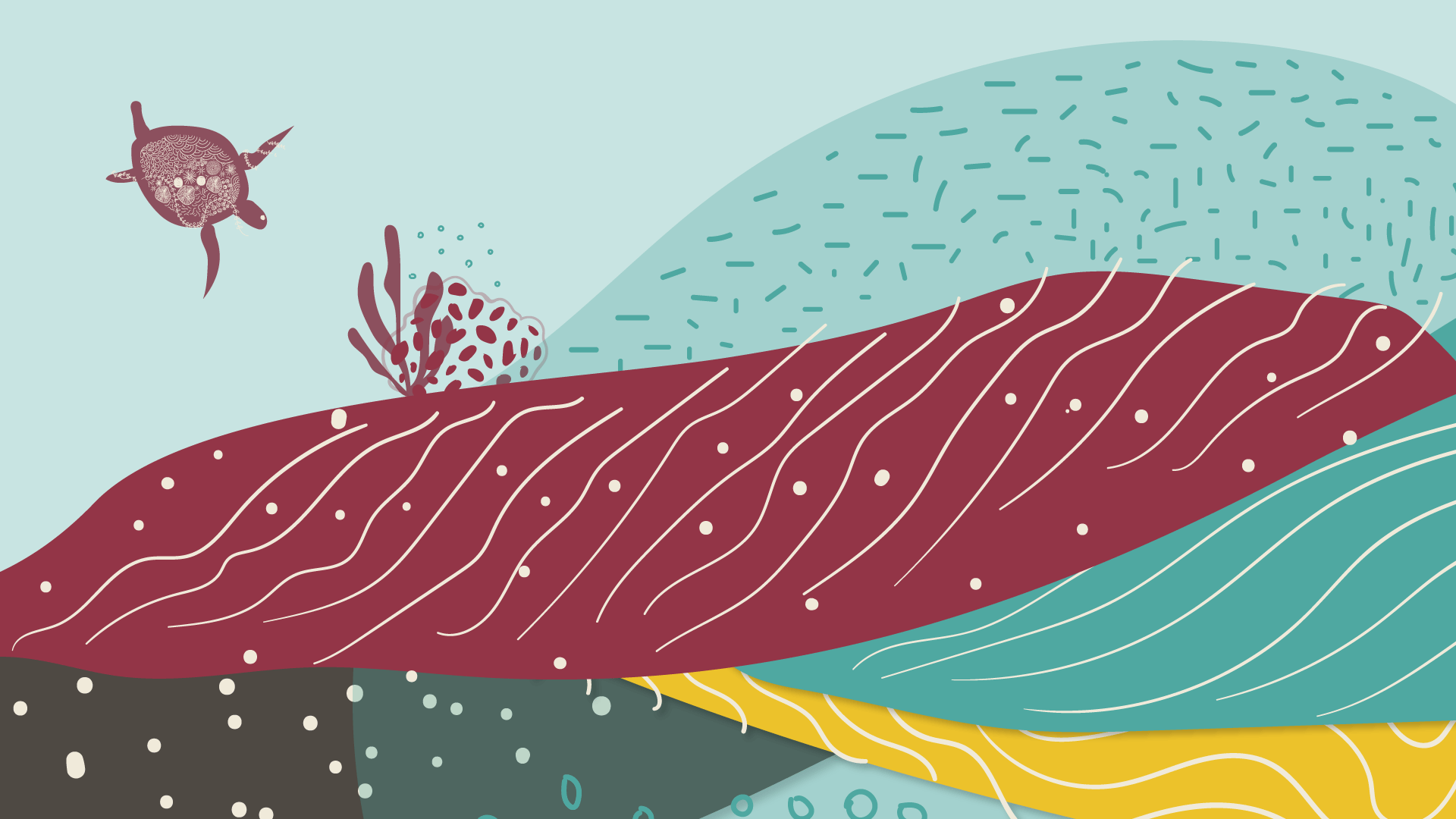Dish of the Day 4 - The collective future of the network: Reframing possibilities
Welcome to this wrap-up of Day 4 of the APC Member Convening 2021! We are glad to see you back here, to be served the fourth Dish of the Day, cooked up collectively with all the diverse ingredients that this inspiring network brings into the kitchen.
Best Futures Awards: Have you nominated the person, collective or organisation that you believe deserves one or more of the awards yet? On the last day of our convening we will announce the nominees in the categories Solidarity, Collaboration, Innovation and Creativity and ask all participants to vote and express their preference. You can add your nominations for the Best Futures Award here.
🎵 Why not listen to some good music while you read the Dish of the Day? Remember that we are adding songs here throughout the week; please add your own!
The plenary: Members collaboration(s) and building of capacity
Our plenary of Day 3 continued the thread on the “Collective Future of the Network”, exploring members' interconnections, member-to-member and member-to-staff intentional collaboration and building of capacity, putting transformation and change at the core of members' joint initiatives.
The plenary started with a video presented by APC's Carlos Rey-Moreno that helped us remember that in spite of the overwhelming feelings of despair and frustration we may face, every day there is something that makes us smile
Oona Castro from Brazilian APC member Nupef, who is also a member of APC's executive board, got us going with reflections on the global scenario we all were part of during the last few years, and how the pandemic affected the way we do things and forced us to rethink our boundaries and priorities.
Oona went through several ways in which the COVID-19 pandemic changed us and, in particular, made face-to-face meetings difficult. These face-to-face meetings were deemed key for the APC network, as it is a diverse constellation of 62 organisations and 31 individual members with a presence in every continent. This can feel hard to navigate if we can only rely on the online realm. As the world is ever changing at a fast pace, the APC network needs to find ways to recreate and reinvent itself.
The possibility of organising hybrid meetings was a recurrent option, but it was also acknowledged that it presents us with challenges in terms of coordinating different time zones and effective connectivity and access, budget planning, meaningful connection and presence. And there is also a lack of vaccines and strong COVID-19 control measures in some member countries.
Another important point raised was that of the connections between the local and the global. “We had to choose, we could not be on all fronts, and we recognised it might be time to look more to the local challenges that our partners, our brothers and sisters in our home countries, and we ourselves are facing,” a member said. "The relationship with the local has been challenging: our partners who are a part of social movements, such as Indigenous people, grassroots people, really lacked connectivity. Implementing projects with partners has become harder for some of us.”
There was an agreement that we need to be strategic when it comes to our approach to presence, assessing access and urgency in local vs. global scenarios: "We need to choose where to be present, we need to be strategic of how the global is addressed, if the local is more urgent."
"Hybrid versions are working and are probably going to be the future," one of the participants emphasised. Several members shared their personal experiences in attending or organising hybrid events and, although there were several challenges to overcome, there was consensus that a hybrid approach is more inclusive, as it allows people who otherwise wouldn't be able to leave their homes or afford to travel to be integrated. "I love these virtual events... for me, it's a significant alternative and I like being able to have it," a member expressed.
The question raised at this point was how can APC support its members in allocating resources to participate effectively in hybrid platforms, as there are infrastructure and connectivity deficits among member organisations. In some instances, the issue might not be connectivity, but the practicality of sharing devices with other people or not having privacy or a room in which to speak and share. One concrete suggestion on this was for APC to carry out a tech scoping of devices, bandwidth and costing and to identify areas that are more in need of support. Another suggestion was to identify partners within the network that have resource centres with good connectivity, where other members from nearby could gather.
Something that APC has learned throughout this journey is that self and collective care are key practices that need to be embedded in the design and implementation of any action, including events. Not only do they sustain us, but also, and more importantly, they help us preserve the human connection and sense of dignity that are often threatened in these adverse contexts we are all navigating. Therefore, care was an important part of the conversation held about online and hybrid events models.
Extending the self and collective care that APC practises to the APC network scale was raised as a conversation we need to have as a network. "Care becomes essential as part of any process of organising events. As APC, we think of events as processes, there is a path we walk together. But there are other events that are not processes. Which kind of spaces does the network need? Do we need a care space where we can learn together and change behaviour, or do we need other kind of spaces that can be more contained, where even if you cannot attend everything, you feel like you can benefit?"
APC's Communications and Information Policy Programme manager, Valeria Betancourt, shared deep provocative reflections that invited the members and staff present to think of how our work has changed and become different now that we are almost two years into the pandemic, and not able to connect to each other face-to-face. How has the relationship with the local changed, adapted, expanded or contracted? And how has the interaction between the local and the global changed? What are some of the learnings and discoveries we can extract from this, but also, what are the challenges that need a more structural response? These are some of the reflections shared:
There are foundations we took for granted that changed as a result of the pandemic. The notion of time has changed, oscillating between an acceleration and a sense of being suspended in time, "in a parenthesis of sorts." This has impacts on the social changes we want to make as a network.
Unpredictability and uncertainty have become a rule, and have increased our sense of fragility. "It feels as if everything we do or don't do will have a decisive bearing on the future. What does this mean in terms of the collective action of movements we work with... and the way in which we set our goals?"
We are connected through our devices and inhabiting the same digital space, and yet we are far away from each other. "The weight of physical boundaries and awareness of the limits of the physical space we inhabit was heightened by the pandemic. We are connected in digital space but demobilised and disconnected on other planes."
The pandemic made inequality, discrimination, exclusion and structural inequity more palpable, and rather than leading us to stagnate in indignation, this reactivated a sense of rebellion and greater commitment to overcoming these challenges.
The relationship between the local and the global has historically driven and guided APC's work. We have a greater awareness of local needs and the kind of global response that should be prioritised. What does this mean for our advocacy at local and global levels?
We are in a "tremendously complex historical moment in which, possibly, the most important anchor of meaning continues to be, for our network, the commitment to a common horizon of dignity and justice in which digital technologies and an open, decentralised, free internet allow us to sustain other ways of life that are compatible with the collective well-being and sustainability of our planet."
How do we shape the sense of "us" going forward, recognising and embracing our diversity, our multi-referential identities, our complementarities, how do we think beyond all the crises and contingencies that surround us at the moment as actors of change in the digital environment and beyond? How do we overcome uncertainty and practice possibility?
It was flagged that a big part of moving into the future is understanding who we are collectively and strengthening our capacities in demanding accountability and reparation for how tech is being used by powerful stakeholders and actors. Advocacy on access was also emphasised as more central and relevant than ever in APC's agenda, as it has become a clearer priority, especially in local contexts.
Looking at the future, the participants agreed that APC, as a 30+-year-old network, must value memory as much as getting ready to open space for the new generations to continue the struggle – in their own way. “We have a commitment to bring new generations into these discussions,” a member commented.
This plenary was closed with a fun drawing and guessing game and a fabulous musical gem: "Beautiful Tango" by Hindi Zahra.
More highlights from Day 4 here!
Our last day of the member convening will start with the first of two plenaries, from 6:30 to 8:00 UTC, while the second will take place from 15:00 to 16:30 UTC. They will both be spaces for us to share and reflect on member experiences that contributed to building solidarity and change and helped the network thrive, as well as to share a consolidated reflection on the three previous plenaries that explored the “Collective Future of the Network”.
The APC Member Convening will close with our Best Futures Awards, which will be a concrete and playful way to name and recognise members’ ability to adapt and thrive. It is your last chance to nominate members for the four awards, don’t miss it!
We will also have a few very inspiring sessions from 9:00 to 13:30 UTC organised by members Pollicy, Women of Uganda Network (WOUGNET), TEDIC and Unwanted Witness.
And yes, it's PARTY time! We will have the party, which was co-planned with many of you, from 16:30 to 18:30 UTC in Ama Waterfall.
If you'd like to see an overview of the agenda for tomorrow in your own time zones, please go to the schedule here.
If you feel inspired and have some spare time, please send us what you have learned about caring for yourself and share care strategies within the network at orgcare@apc.org.
Almost there! Remember that if you were unable to attend the plenaries, we have set up a Mattermost channel that participants can join to participate asynchronously. Please feel welcome to add your thoughts and suggestions!
And that's it for now! Come back tomorrow for the last Dish of the Day to catch up on anything you may have missed from Day 5, the last day of our convening!



